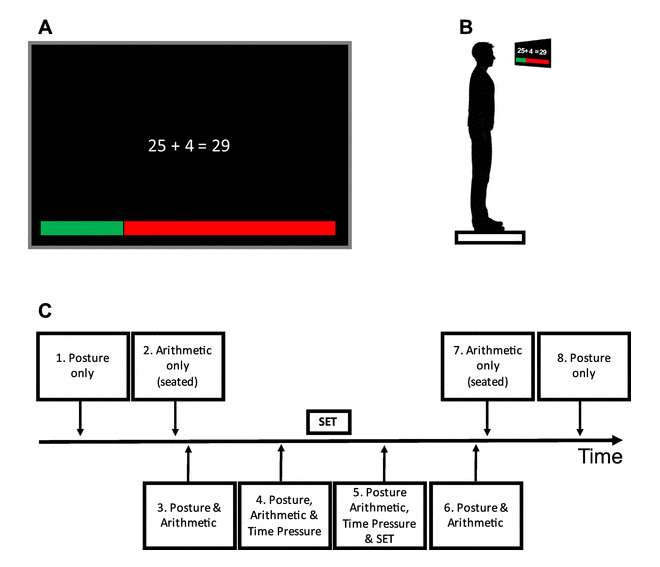No sway! Arithmetic + anxiety = a stiffer posture

Anxiously solving sums under pressure reduces the amount you sway, a new study supported by Brunel University London suggests.
Your postural sway – or the amount your balance shifts whilst stood upright – decreases when you're made to feel anxious, the new research demonstrates. It's hoped the results, which have been published in the journal Experimental Brain Research, will be useful in developing tools for those at risk of falling.
Dr Will Young from Brunel's Ageing Studies research theme, who co-authored the research alongside project lead Dr Mihalis Doumas from Queen's University Belfast, said: "We know a lot about how anxiety can influence the way people allocate mental resources during cognitive tasks – for instance when doing a maths exam.
"However, much less is known about how anxiety influences the way we control our physical movements."
To investigate how anxiety affects balance, Dr Young asked twelve young adults (eight females and four males) to stand on a force plate and perform four separate tasks – an arithmetic test, a postural control test, both tests concurrently, and both tests concurrently with added time pressure.
The participants were then given negative feedback about their performance in the arithmetic test and asked to perform it again under observation.
The results showed that postural sway and reaction times were unaffected in the first three tests, but when time pressure was added in the fourth test, reaction times and sway increased.
However, when anxiety was introduced by the negative feedback – termed 'social evaluative threat' (SET) – a significant reduction in sway was noted.
"When performing simple cognitive tasks, postural sway remains either largely unchanged or slightly increased," said Dr Young, a lecturer in Rehabilitation Psychology at Brunel. "However, when anxiety is raised using experimental manipulations, postural sway is markedly reduced and simple reaction times become greater."
The effect can be described as a 'stiffening strategy,' akin to a rabbit trapped in the headlights.
It's hoped the results will have practical implications in the development of therapeutic tools for older adults at risk of falling.
"If you are going to train a system, you have to understand the system and this study contributes to our understanding of how anxiety influences the way we control our balance," said Dr Young.
"We are now carrying out a similar task with older adults and plan to develop a series of tools for reducing fall-risk by targeting raised anxiety in older adults fearful of falling."
More information: Michail Doumas et al, Cognitively and socially induced stress affects postural control, Experimental Brain Research (2017). DOI: 10.1007/s00221-017-5128-8




















